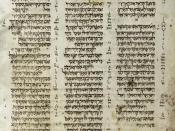Human suffering is universal and inescapable. When there is joy, there is pain waiting to happen. When there is pain, an individual always tries to escape it. Humans are faced with hardships in life, and along with those hardships come emotional distress and pain. Humans attempt to understand the reasoning for suffering, the inflicting pain and stress that they have to endure. Humans cannot resolve their own problems, they turn to God or another form of religion to answer questions about the imperfections of life. The complexity of human suffering is hard to grasp because of its infinite forms, which makes it difficult to escape from.
Although humans suffer regardless of their age, race, or gender, they suffer in different ways. Some people have to suffer more than the others, which make humans question the dissatisfaction and unfairness of life. Harold Kushner's son, Aaron, was diagnosed with progeria in his infancy, aging rapidly and dying at an early age (Kushner 452-53).
Of all the other babies, Aaron was the baby chosen by fate to suffer a deadly illness. The chance of getting this disease is so rare that Kushner's son's illness seemed unfair to his family. Kushner cries, "On what grounds did Aaron have to suffer? He was an innocent child. Why should he be condemned to grow into adolescence . It simply didn't make sense" (453). Kushner exclaims that his son was mistreated and obstruction of the progeria disease had not allowed Aaron to grow up as a normal child, taking him away from his family. Kushner questions why Aaron had to be the one forced to endure the pain and suffering. Gilman states, "The classic explanation for suffering throughout the Bible-with the notable exception of the Book of Job and some of the Psalms-is that it is...



I like it but...
Do you have your bibliography? I'd like to see what books you got some of those quotes from.
1 out of 1 people found this comment useful.